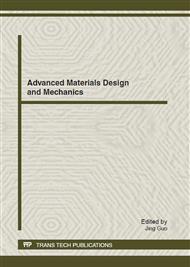[1]
Laurent Linnemer, Price and advertising as signals of quality when some consumers are informed, International Journal of Industrial Organization, Vol. 20, Issue 7, September 2002, Pages 931–947.
DOI: 10.1016/s0167-7187(01)00081-9
Google Scholar
[2]
Steven R. Grenadier† Neng Wang, Investment Timing, Agency and Information.
Google Scholar
[3]
Ren Yulong, Yang Feifei, game-based signal analysis of environmental regulatory mechanism of conspiracy - to China's power industry, environmental monitoring, Technology Management Research, 2010, 7: 227-229(in Chinese).
Google Scholar
[4]
Philip Jones, John Hudson, Signalling product quality: When is price relevant? Journal of Economic Behavior & Organization, Volume 30, Issue 2, August 1996, Pages 257–266.
DOI: 10.1016/s0167-2681(96)00883-9
Google Scholar
[5]
Mr Yeung Hung, Wang Ying Luo, owners of major infrastructure projects and other parties conspired Game Analysis [J]. Engineering and Engineering Management, 2006, 2: 126-129(in Chinese).
Google Scholar
[6]
Guo Nanyun, conspiracy construction field dynamics and governance [J]. Social scientists, 2008, 2: 114-117(in Chinese).
Google Scholar
[7]
Louis Thomas, Scott Shane, Keith Weigelt, An empirical examination of advertising as a signal of product quality. Journal of Economic Behavior & Organization, Vol. 37, Issue 4, 30 December 1998, Pages 415–430.
DOI: 10.1016/s0167-2681(98)00118-8
Google Scholar
[8]
Juergen Noll, Comparing qualitysignals as tools of consumer protection: are warranties always better than advertisements to promote higher product quality? International Review of Law and Economics, Vol. 24, Issue 2, June 2004, Pages 227–239.
DOI: 10.1016/j.irle.2004.08.007
Google Scholar
[9]
Zhang Weiying. Game Theory and Information Economics [S]. First edition, Shanghai: Shanghai People's Publishing House,2004,11 (3): 191(in Chinese).
Google Scholar
[10]
SCOTT E. ATKINSON, DONALD H. A Cost-Effectiveness Analysis of Alternative Air Quality Control Strategies, ENVIRONMENTAL ECONOMICS AND MANAGEMENT 1, (1974).
Google Scholar


